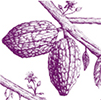Coping during and after the pandemic – Simon Wright

Coping during and after the pandemic
By Simon Wright, Of+ Consulting Founder and Academy of Chocolate Board Member
In the UK, the lockdown has stimulated sales of bars of chocolate as we spend more time at home with our families. I do wonder whether it’s a shared treat or a coping mechanism.
It’s safe to say that the pandemic has had little impact on most chocolate consumers, beyond making trips to the supermarket take longer. Supply chains have held up well and both major brands and own label bars have been freely available.
For smaller artisan producers, however, it has been more challenging as consumers have cut back on travelling and specialist retail outlets have shut.
The impact on cocoa farmers has been much greater. Governments throughout Central and South America immediately closed their borders making the export of cocoa beans impossible. In some parts of Peru, local governments imposed restrictive and bureaucratic working procedures on co-ops. The timing was unfortunate as in Ecuador, Peru and the Dominican Republic, the pandemic came in the middle of the harvest.
While the situation has now eased, ongoing government restrictions on mobility of producers has led to a reduction of up to 50% of field activities. This may lead to delays in export shipments.
Memories of the devastating effect of the Ebola virus led many African countries to respond to the prospect of CV19 with immediate and drastic action. Ghana closed its borders. The co-op Kuapa Kokoo closed its offices and ceased field activities on 19 March, although the lockdown has just been relaxed so that activity can resume, albeit slowly. Sierra Leone declared a state of public emergency: cocoa activity is still happening through the introduction of stringent hygiene practices. The co-ops in São Tomé are still active.
On a positive note, buyers are not cancelling contracts. One thing that has become apparent is the value of support supplied to producers by organisations such as Fairtrade.
The guaranteed minimum prices plus social premium are invaluable at times of such volatility. Plus, the structures that come with Fairtrade means there is an effective way of disseminating information such as World Health Organisation protocols on physical distancing.
The impact of the pandemic is vast and varied, but there are measures we can all be taking to cope during the current pandemic.
Below are some suggested actions for Academy of Chocolate members:
Chocolate manufacturers Talk to your suppliers. Do farmers need pre-finance to help them survive until the new crop is paid for? Make sure you have enough packaging material as lead times are only going to get longer. If you are eligible for government loans make sure you apply for them. When the government’s safe manufacturing protocols are finalised, ensure your production unit can meet them (especially the physical distancing requirements).
Chocolate retailers If you do not sell via your website, now is the time. The Guild Of Fine Food have written this simple guide on moving your business online. Plus, an enhanced online presence will allow you to run daily tastings, chocolate cookery demos and other enticing content that will encourage your customers to buy more chocolate from you. Visit Cocoa Runners to see what is possible.
Chocolate consumers Please support your local artisan chocolate manufacturer. Buy high quality chocolate from sustainable sources and send it to your mum, your best friend or yourself. Explain to your friends about how important it is to pay a fair price for a decent quality bar of chocolate in these challenging times. If you end up with too much chocolate, start baking. It is your duty to eat lots of chocolate but please choose schemes such as Fairtrade to support cocoa farmers who are experiencing real challenges at present. They may be out of sight, but not out of mind.
With thanks to Ximena Herrera at CLAC and Sophi Tranchell at Divine Chocolate for their very helpful input.


